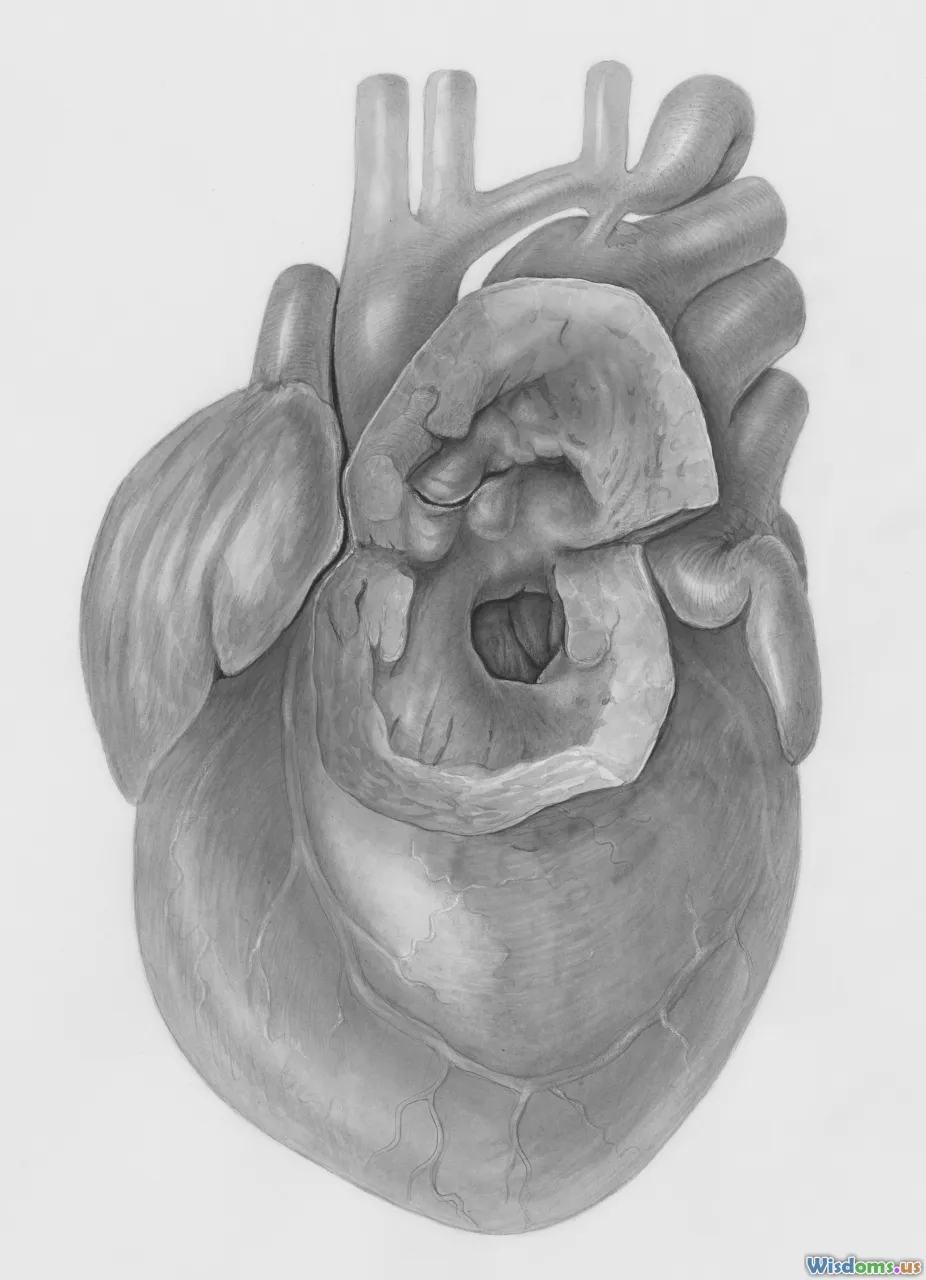
Strategies for Stress Management With Heart Disease
13 min read Discover effective stress management strategies tailored for individuals living with heart disease, promoting heart health and emotional wellbeing. (0 Reviews)
Strategies for Stress Management With Heart Disease
Living with heart disease isn't just about prescriptions and routine check-ups—it calls for a full-scale approach to well-being, especially when it comes to managing stress. Unchecked stress is more than a fleeting emotion; it's a silent amplifier of risk factors that can worsen outcomes for heart patients. Fortunately, effective stress management strategies exist, tailored for people with heart conditions, that can help reduce health risks and improve quality of life.
Understanding the Heart-Stress Connection

Stress isn't merely "in your head." When you feel threatened or anxious, your body responds by releasing stress hormones such as cortisol and adrenaline. These hormones prompt physical changes—raising blood pressure, quickening the pulse, and tightening blood vessels—that can strain a heart already challenged by disease.
Recent studies underscore the impact: according to the American Heart Association, emotional stress increases the likelihood of heart attack, can worsen symptoms of angina (chest pain), and has even been linked to increased risk of arrhythmias. Chronic stress may also spark unhealthy coping behaviors—over-eating, smoking, or skipping medication—that compound cardiovascular risk.
Example: Consider Fred, a 62-year-old dealing with coronary artery disease. When his work deadlines piled up, he found himself reaching for junk food and forgetting his evening walks. His blood pressure readings began inching upward. With proper stress management techniques, Fred regained control over both his emotions and his physical health, proving the powerful mind-heart connection.
Mindfulness and Meditation: Calming the Storm

Mindfulness correctly earns its place as a cornerstone of stress reduction for cardiac patients. Practices such as guided meditation, deep-breathing exercises, and body scans have been proven to lower stress hormone levels and improve heart rate variability—a key measure of cardiovascular resilience.
How to Apply:
- Begin each day with a short mindful breathing session: Five to ten minutes of slow, deliberate breathing lowers blood pressure and sets the tone for a calmer day.
- Use guided meditation apps: Free resources like Insight Timer, Headspace, and Calm offer heart-healthy daily meditations.
Insight: Clinical trials published in journals like Circulation and the Journal of the American Medical Association suggest that people who practice regular mindfulness enjoy significantly reduced markers of inflammation and stress, both critical for heart health.
Physical Activity: Moving to Manage Stress

It's well-established—exercise is powerful medicine. For those with heart disease, the right physical activity program not only improves stamina and cardiac function but also relieves stress.
- Walking in Nature: Even a 20-minute stroll has been shown to decrease cortisol and ease anxious thoughts.
- Low-Impact Options: Tai Chi, gentle yoga, or chair-based routines suit a range of physical limitations, ensuring everyone can access the mental health benefits of movement.
Example: Mildred, a 70-year-old woman with a pacemaker, joined an online chair yoga group. After three months, she reported sleeping better and feeling calmer—her cardiologist noticed improved blood pressure as well.
Tip: Always consult your doctor before starting new activities, and work with cardiac rehab specialists to tailor programs safely.
Social Support Systems: Buffering the Impact of Stress

Strong human connections act as a buffer against the hazardous effects of chronic stress. Heart disease can be isolating, but reaching out for support transforms coping into a collective endeavor.
Types of Support:
- Family and Friends: Make time for meaningful conversations and shared activities, which release feel-good hormones like oxytocin.
- Support Groups: Cardiac recovery groups or virtual communities such as Mended Hearts offer camaraderie, advice, and encouragement.
- Therapy: Psychologists and licensed social workers skilled in cardiac counseling can teach practical tools for managing day-to-day pressures specific to heart patients.
Real-world Example: After his bypass surgery, Carlos felt overwhelmed and alone. By attending weekly sessions with a local heart support group and talking openly with loved ones, he developed healthier habits and a more optimistic outlook on recovery.
Nutrition: Calm From the Kitchen

Stress and diet share a complicated relationship. High-stress levels often trigger poor dietary choices, while certain concoctions can exacerbate heart health woes. Conversely, heart-friendly eating habits can stabilize mood and buffer the impact of stress.
Practical Tips for Stress-Proof Nutrition:
- Opt for balanced, predictable mealtimes: Preparation reduces decision fatigue and lowers cravings for high-fat, high-sugar foods.
- Emphasize Mediterranean-style foods: Fruits, vegetables, lean proteins (fish or poultry), and whole grains not only support heart health but have been shown to reduce symptoms of depression and anxiety.
- Limit caffeine and alcohol: Both may heighten nervous system arousal, undermining stress control efforts. For many, herbal teas (chamomile, rooibos) can soothe nerves without straining the heart.
Positive Change: Joining a weekly meal-preparation class at her rehab center, Janine learned to cook delicious, stress-busting recipes, building her confidence and sense of agency over her health.
Cognitive Behavioral Techniques: Reframing the Narrative

Cognitive Behavioral Therapy (CBT) offers evidence-based tools to challenge negative thought patterns—a particular boon for heart patients facing recurring stress or anxiety about their health.
CBT at Home:
- Thought Journaling: Write down stressful events, thoughts, and feelings, and practice challenging unhelpful ideas. For example, shift from “I’ll never get better” to “I can manage my risk and live well.”
- Behavioral Experiments: Systematically test whether feared outcomes occur ("If I go for a walk, will disaster really follow?").
- Professional Support: Working with therapists trained in CBT can provide structure, accountability, and mastery over avoidance behaviors that drain energy and increase stress.
Fact: Numerous heart rehab programs across Europe and North America now include CBT modules, significantly improving quality of life indicators in participants with persistent anxiety or depression.
Sleep: The Overlooked Pillar of Stress Control

Subpar sleep is both a symptom and a cause of high stress—and it's dangerously commonplace in adults living with heart disease. Yet restorative sleep is essential for emotional regulation, immune function, and cardiac recovery.
Tips for Improved Sleep:
- Consistent schedule: Go to bed and wake up at the same time daily, even on weekends.
- Screen-free wind-down period: Limit blue light exposure and engage in quiet activities (reading, stretching) before bed.
- Optimize the sleep environment: Cool, dark, and quiet rooms promote deeper slumber.
Highlight: Research from the National Sleep Foundation has shown that heart patients who implement better sleep habits not only experience improved mood and stress control but also see measurable reductions in nighttime blood pressure spikes.
Time Management and Setting Priorities

Juggling doctor appointments, medications, family obligations, and lifestyle changes can be overwhelming. Proactive time management helps reduce the "all-at-once" trap and allows you to focus on what matters most for heart health.
Actionable Steps:
- Use planners: Physical diaries or smartphone apps help track medications, appointments, and self-care routines.
- Break tasks into smaller steps: Instead of seeing a week of tasks, concentrate on today's manageable goals.
- Learn to say no: Setting boundaries preserves energy for moments that feed recovery and fulfillment, reducing resentment and tension.
Firsthand Experience: Paul, recently diagnosed with heart failure, created a weekly schedule that included three goals: daily medication, 20-minute walks, and dedicated family time. The visibility of his priorities fueled positive momentum and calmed chaotic thoughts.
When Stress Feels Overwhelming: Knowing When to Seek Help

Self-management has its limits. When stress becomes unmanageable—marked by frequent panic attacks, sleepless nights, or thoughts of hopelessness—it’s crucial to seek professional intervention.
How to Reach Out:
- Start with your cardiologist: Many cardiac clinics offer referral lists for therapists who specialize in chronic illness.
- Primary care providers: They can also monitor and treat stress-related symptoms, including medication if needed.
- Online platforms: Trusted services like the American Psychological Association locator tool, BetterHelp, or local hospital mental health programs can connect you to help when leaving home isn’t practical.
Fact to Note: Timely help has measurable benefits—not only can professional counseling reduce stress, but studies also link it to decreased hospital readmissions for heart disease patients.
Effectively managing stress with heart disease isn't an add-on; it's intrinsic to your healing journey—infusing each heartbeat with the promise of resilience. By integrating mindful breathing, nourishing foods, movement, connection, and support, every person with heart disease can rewrite their story of recovery, one calm decision at a time.
Rate the Post
User Reviews
Popular Posts















